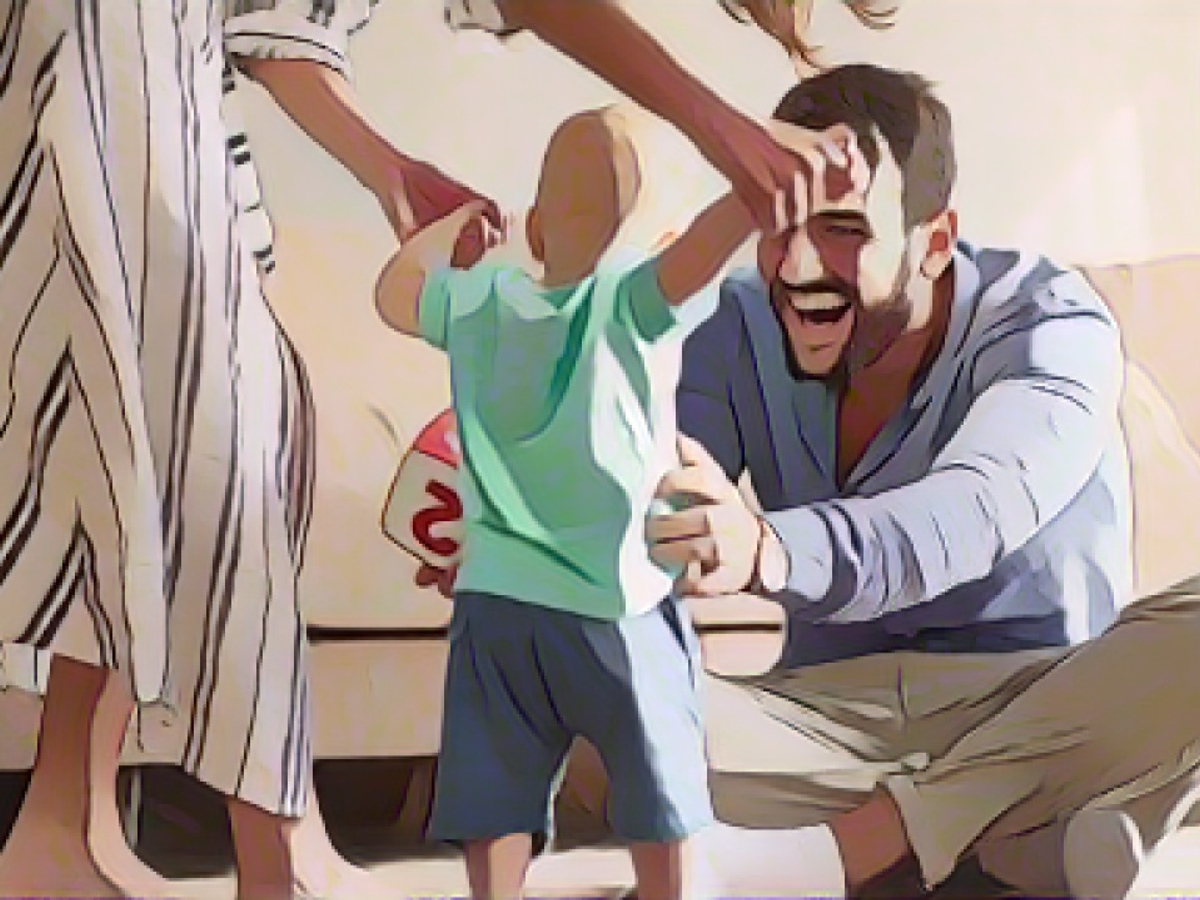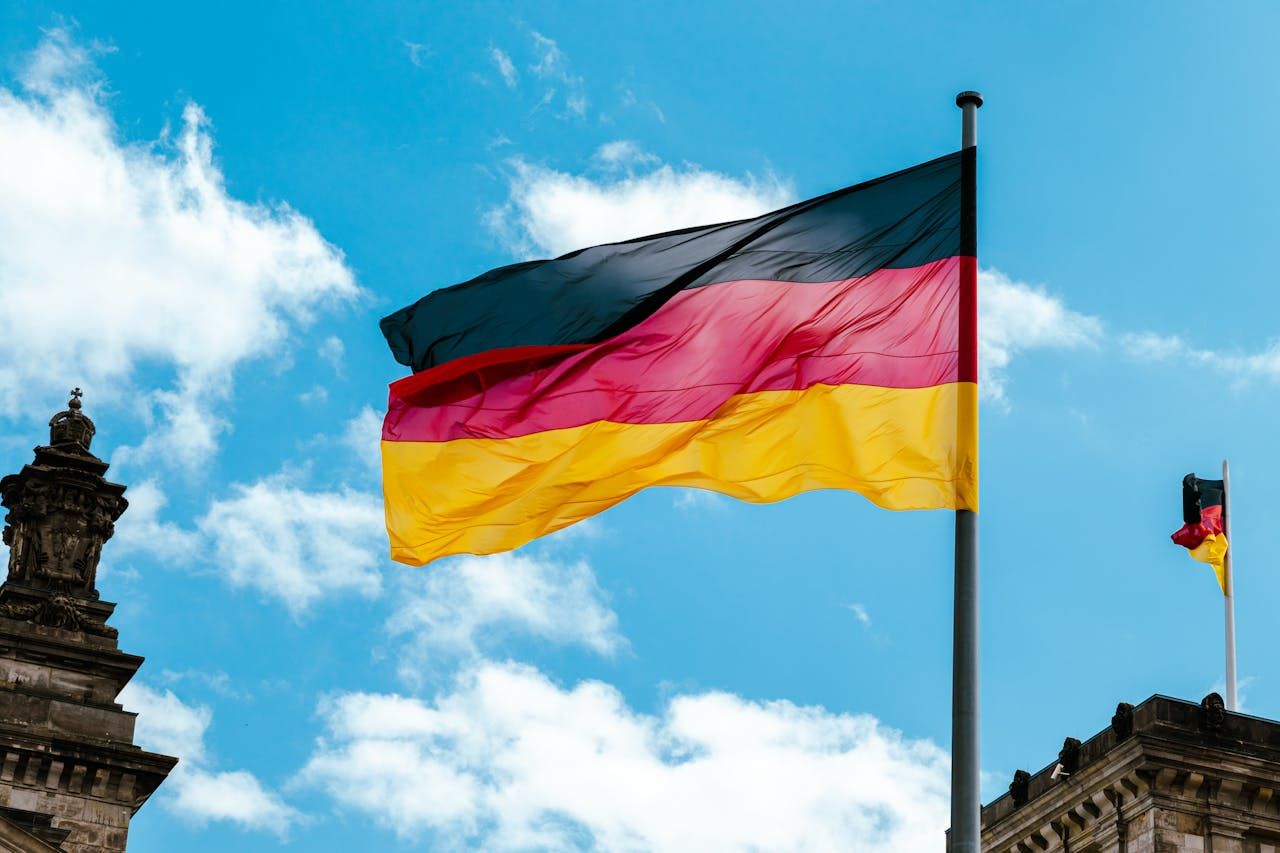Born in Germany
When a child is born, there is usually great joy. In addition to all the other questions about pregnancy and raising children, refugees and migrants also have questions about residence. Here we explain what rights you and your child born in Germany have.
What rights do we have?
Will my child born here receive German citizenship?
A child born in Germany receives German citizenship at birth if at least one parent has German citizenship at the time of birth or has been legally resident in Germany for at least eight years and has a settlement permit. "Legally" means that you have had a residence permit for the entire period. The period during your asylum procedure is also considered legal if your asylum application was approved.
In addition to German citizenship, your child can also have the citizenship of your country.
Please note: If you are not married and only the father of the child has German citizenship or has been legally resident in Germany for at least eight years and has a permanent residence permit, the father must officially recognize the child in order for the child to obtain German citizenship. You can find out more about acknowledging paternity in the section "What is acknowledgment of paternity?".
If both parents do not meet the above requirements, the child will not automatically be granted German citizenship. In this case, you can only have your child naturalized later.
Important: There are special requirements for the acquisition of German citizenship for children of stateless persons. Children of stateless persons must meet the following requirements:
- The child must be stateless from birth.
- The child must have been born in Germany or in a German airplane or on a German ship.
- The child must have been legally resident in Germany for at least five years.
- The child must not have been sentenced to a prison term of more than five years.
- The child must apply for naturalization before his/her 21st birthday.
Will my child born here receive a residence permit?
Whether a child born here receives a residence permit depends on the status of its parents.
If one parent is already recognized as a person entitled to asylum, refugee or subsidiary protection, your child born in Germany has two options:
- If you can obtain a passport for your child from your home country or if the child is also registered in your passport, your child can obtain a residence permit in accordance with §33 AufenthG. To apply for the residence permit, you must go to the immigration office responsible for you and present your residence permit as well as the child's passport and birth certificate. Please note that as a recognized refugee or person entitled to asylum, you are not allowed to visit your home embassy or your home country. You can find information on the subject of birth certificates in our Pregnancy chapter.
- You can apply for asylum for your child. To do so, you must send an informal letter to the office in Nuremberg (BAMF, Referat 716, Frankenstraße 210, 90461 Nuremberg) stating that you wish to apply for asylum for your child born in Germany. You must enclose your details and your file number at the BAMF and a copy of the child's birth certificate with the letter. As a rule, the child will be given the same status as you. This means, for example, that it will also be recognized as a refugee if you are a recognized refugee. As soon as the BAMF has decided on your child's asylum application, you will receive a letter. You must then take this letter, your police registration, birth certificate and a passport photo of your child to the immigration office responsible for you.
If you are still in the asylum procedure, your asylum application has been rejected or you have been granted a residence permit due to a ban on deportation (§25 Paragraph 5 AufenthG), an asylum procedure will automatically be initiated for your newborn child. It will then receive a residence permit. In order for the asylum procedure to be initiated, you must inform the Immigration Office of the birth of your child. To do this, bring the birth certificate or the register extract from the registry office to the immigration office. You can find information on birth certificates in our chapter on pregnancy. The Foreigners' Registration Office will then inform the BAMF. As soon as the asylum procedure for your child has been initiated, you will be informed in writing. You will then be asked whether you wish to waive the asylum procedure for your child. Seek advice on this from an advice center or a law firm, as this can be a difficult decision: After all, if your own asylum application has been rejected, it is likely that your child's asylum application will also be rejected. However, your child will then not receive a simple rejection, but a rejection as "manifestly unfounded". A rejection as "manifestly unfounded" has serious consequences for the departure deadline and possible re-entry at a later date. You can find out more about this in our chapter Rejected asylum application. You can find advice centers in your area on our Local information page. Enter the city in which you live and search for asylum, right of residence or legal advice. If you do not wish to carry out an asylum procedure for your child, your child will receive a tolerated stay.
Please note: If you have a tolerated stay permit yourself, your child will also receive a tolerated stay permit.
Do I get a residence permit if I have a German child?
If you have a German child, you can obtain a residence permit for "family reunification with Germans" (§28 Paragraph 1, Sentence 1, No. 3 AufenthG). You can also obtain this residence permit if you are already in Germany. The prerequisite for this is that you actually take care of the child. You can prove this by submitting a joint custody declaration. With a custody declaration, you share custody of your child. The person who has custody is responsible for the upbringing of the child. They decide, for example, which kindergarten or school the child goes to, who they have contact with and where they live. Only if the child's parents are legally married do they both automatically have joint custody of their child. If they are not legally married, the mother has sole custody. If she wishes to share custody with the child's father, both parents must submit a so-called "custody declaration" to the youth welfare office responsible for you. You can find the youth welfare office responsible for you on the website jugendaemter.de. In addition to this custody declaration, you will also need the following documents to apply for a residence permit
- a valid passport
- the child's birth certificate on which you are registered as the mother/father (information on birth certificates can be found in our chapter on pregnancy)
- a declaration from the other parent or other proof that you are actually looking after the child if you are not living with the child.
You do not have to prove that you are able to support yourself. This means that you can also obtain this residence permit if you receive money from the job center or the social welfare office.
Please note: In order to obtain this residence permit, you must not be subject to a residence ban (e.g. due to a previous deportation).
After three years with this residence permit, you can then apply for a settlement permit in accordance with §28 Paragraph 2 AufenthG. The prerequisite for this is that you continue to look after the child and can provide evidence of basic German language skills.
If you do not meet the requirements for §28 AufenthG, e.g. because you do not have custody of your child, you can obtain a residence permit in accordance with §25 Paragraph 5 AufenthG. In order to obtain a residence permit in accordance with Section 25 (5), you must also meet certain requirements. You can find out more about this in our chapter " Right of residence for tolerated persons " in the section "Residence permit for humanitarian reasons".
Do I get a residence permit if I have a child with a residence permit?
If your child has a residence permit through the other parent, you also have the option of obtaining a residence permit. Whether this is successful varies from case to case. If you want to know whether you can obtain a residence permit through your child, you need to ask an advice center or a law firm. You can find lawyers and advice centers in your area on our Local Information page. Enter the city in which you live and search for asylum, right of residence or legal advice.
In any case, the basic requirement is that you take care of the child. As the father, you must also have acknowledged paternity and signed a joint custody declaration. In this custody declaration, you share custody of your child with the other parent. The parent who has custody is responsible for the upbringing of the child. For example, they decide which kindergarten or school the child goes to, who they have contact with and where they live. Only if the child's parents are legally married do they both automatically have joint custody of their child. If they are not legally married, the mother has sole custody. If she wishes to share custody with the child's father, both parents must submit a so-called "custody declaration" to the youth welfare office responsible for you. You can find out more about acknowledging paternity in our chapter on pregnancy. You can find the youth welfare office responsible for you at jugendaemter.de.
Please note: If your minor child has been recognized as a refugee or a person entitled to asylum, the rules on family reunification apply to you. You can find out more about this in our chapter on family reunification.
What does "acknowledgment of paternity" mean?
If you are not married, the father of the child can have paternity recognized. Only if the father acknowledges paternity is the father liable to pay maintenance to the child. And only then can the child also receive the father's citizenship, for example. To acknowledge paternity, the child's parents must go together to the youth welfare office responsible for them. You can find the youth welfare office responsible for you at jugendaemter.de.
Acknowledging paternity is free of charge. The mother must bring her maternity record, her identity card and her birth certificate. The father must bring his ID and birth certificate. Foreign birth certificates must be translated by a sworn interpreter. If you wish to acknowledge paternity after the birth, you must also bring your child's birth certificate. If you do not have the required documents, it is generally not possible to acknowledge paternity. In this case, seek advice from an advice centre or a law firm that specializes in advising refugees and asylum seekers. You can find lawyers and advice centers in your area on our Local information page. Enter the city in which you live and search for asylum, right of residence or legal advice.
Please note: The Youth Welfare Office can report your application for paternity recognition to the Immigration Office if the staff at the Youth Welfare Office think that you are only recognizing paternity in order to obtain a residence permit for yourself, the mother or the child. The Immigration Office will then review your case. However, they can only do this if you are not the biological father. If the foreigners authority examines your case, you should contact a law firm or an advice center.
What can I do if the father does not want to acknowledge paternity?
If the father of the child does not want to acknowledge paternity, you can apply to the family court to establish paternity. The family court will then order a "paternity test". A paternity test compares the DNA of the father and the child. In this way, it can be proven whether the presumed father is really the father of the child. You can find the family court responsible for you on the gerichtsverzeichnis.de website.
Important
There are special requirements for children of "stateless persons" to acquire German citizenship. You can find out more about this in the section "Will my child get German citizenship?".
Source: handbookgermany.de








